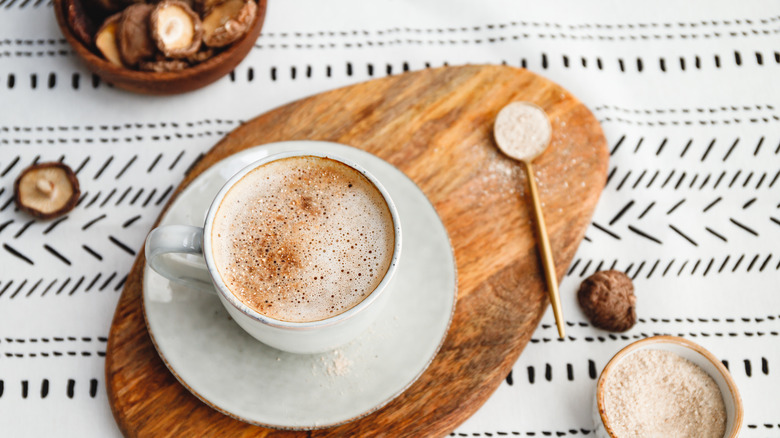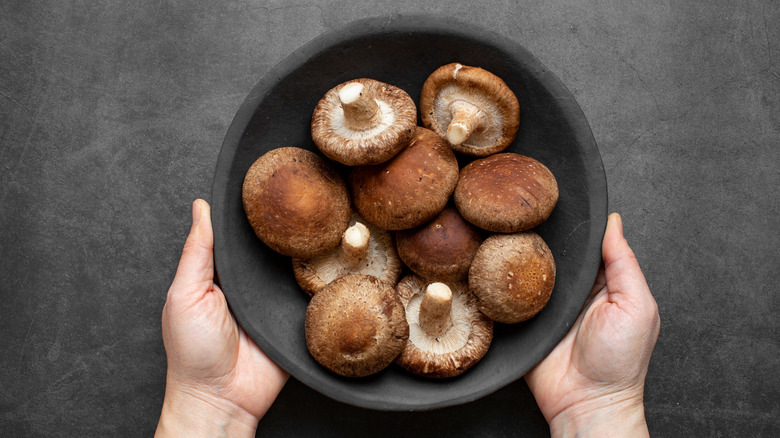Why You Should Think About Trying Mushroom Coffee
Mushroom coffee has become quite trendy. If you're on social media, you've likely seen people sipping this popular drink. So, what is mushroom coffee? Does it taste good? According to Cleveland Clinic, mushroom coffee doesn't taste much different than regular coffee. Reishi, chaga, lion's mane, and cordyceps are the most commonly used mushrooms for coffee blends. But don't go stocking up on the fresh versions and blending them into your coffee. Typically, mushrooms go through a drying and extraction process before getting mixed with regular coffee.
While mushroom coffee is generally considered safe, it isn't entirely risk-free. For example, if you've had a history of kidney problems, you might run into trouble. Chaga mushrooms contain high amounts of oxalates, a plant compound found in foods that can increase your risk of kidney stones (via Cleveland Clinic). It may help to try one mushroom powder at a time to gauge your body's response and track symptoms so you can either switch powders or stop consuming them altogether.
Mushroom coffee may provide anti-inflammatory benefits
Enjoying a morning cup of mushroom coffee may help reduce inflammation in the body. According to Harvard Health Publishing, persistent inflammation can increase one's risk of health conditions such as depression, arthritis, heart disease, cancer, and Alzheimer's. Fortunately, one of the best ways to fight inflammation is with a healthy diet and incorporating more anti-inflammatory foods, like mushrooms. When combined with coffee, which also contains anti-inflammatory properties and polyphenols, you may get even more of the health effects.
Many mushroom varietals contain polysaccharides, phenolic compounds, and terpenoids, which help reduce inflammation in the body. A 2014 study published in Mediators of Inflammation found that high inflammatory responses in the body cause significant cell damage. However, mushrooms can act as an inflammation mediator to suppress the inflammatory response. Additionally, a 2017 study published in the Annals of The New York Academy of Sciences suggested that the adaptogenic properties in mushrooms are particularly beneficial for reducing chronic inflammation.
It may actually help you sleep better
It sounds counterintuitive, but you may sleep better if you drink mushroom coffee. According to Healthline, mushroom coffee has about 50% less caffeine than regular coffee, and caffeine reduction is a helpful strategy for improving sleep. A 2016 study published in Nutrients found that high caffeine consumption is correlated with less time spent in bed. Further, those who reported poor sleep quality ingested more caffeine than those who reported good sleep quality.
In addition to affecting sleep quality and time in bed, caffeine can make it harder to fall asleep and reduce your total sleep time. It's important to note that mushroom coffee still has some caffeine, so make sure you don't drink it too close to bedtime. Additionally, some people react differently to caffeine than others. For improved sleep, you may want to avoid it altogether. In that case, if you still want the benefits of mushrooms, you can add a mushroom powder to a smoothie or other decaffeinated drinks.
Mushroom coffee may help you better manage stress and anxiety
Perhaps one of the most significant benefits of consuming mushrooms is the ability to resist and reduce the impacts of stress. This is due to the adaptogenic properties in mushrooms, which support the body's ability to return to homeostasis after experiencing a stress response, per Well+Good. Specifically, reishi mushrooms can help calm you down when you feel stressed due to their effects on the adrenal system.
Additionally, a 2021 study published in the Journal of Affective Disorders measured cross-sectional data from nearly 25,000 survey participants. The researchers hypothesized that bioactive compounds found in mushrooms, such as vitamin B12, antioxidants, and anti-inflammatory components, are associated with reduced anxiety. They further suggested that mushroom intake is associated with decreased risk of depression for American adults. However, the researchers indicated that further information is needed to determine which mushroom varietals are most effective.
If you experience stress or anxiety after drinking coffee, switching to mushroom coffee could help.




